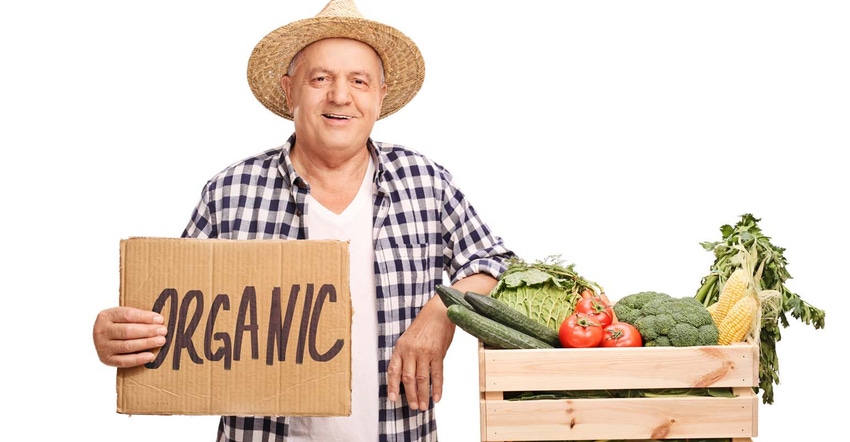April 12, 2018

The Organic Trade Association this week ratcheted up its court battle against USDA over the agency’s failure to put into effect new organic livestock standards.
Related: Production requirements for organic livestock, poultry clarified
The Organic Trade Association was joined by the American Society for the Prevention of Cruelty to Animals and the Animal Welfare Institute as co-plaintiffs in a new filing that revised the original complaint against USDA to reflect the department’s move to withdraw the rule.
“We welcome the critical support of our friends in the animal welfare community in standing up against the administration’s attack on this important organic standard,” said Laura Batcha, CEO and Executive Director of the Organic Trade Association. “In USDA’s attempt to kill this fully vetted final regulation, they’ve taken a radical departure from conclusions reached over more than 20 years of rulemakings regarding organic livestock care, and have assumed an aberrant view that has no historical basis or legal justification.
Related: USDA delays organic rules to November 2017
What is National Organic Program’s authority?
USDA on March 13 announced its intention to withdraw the final regulation on May 13, contending that the Organic Foods Production Act gives the National Organic Program the authority to regulate only veterinary medications, not animal care, welfare or production standards. The Organic Trade Association’s amended complaint --filed on April 11 in the U.S. District Court for the District of Columbia -- argues that this new claim by USDA is a “novel and erroneous” view of OFPA that “conflicts with every prior administration’s approach to rulemaking under the OFPA and the National Organic Standards Board.”
Related: USDA withdraws Organic Livestock and Poultry Practices final rule
The Organic Trade Association is also challenging USDA’s assertion that it does not have to consult with the National Organic Standards Board -- the advisory board to the National Organic Program established by OFPA – before withdrawing the regulation.
“The organic standard-making process established by Congress requires consultation with the National Organic Standards Board to make or amend existing organic standards,” said Batcha. “The day the Organic Livestock and Poultry Practices final regulation was published, it became the regulation of the National Organic Program. Withdrawal of this regulation requires NOSB’s consultation and review.”
‘Flagrantly disregard’
The Organic Trade Association said that USDA continues to flagrantly disregard and refuse to consider the overwhelming support from the public for the organic animal welfare rule.
“USDA knows the public overwhelmingly supports the implementation of the Organic Livestock and Poultry Practices regulation. Indeed, in its announcement to withdraw the rule, USDA noted that out of the 72,000 comments it received, over 63,000 opposed the withdrawal of the final rule, and that only 50 supported its withdrawal,” said Batcha. “But despite the clear evidence of the public sentiment, USDA is acting against the will of the public, and the will of the organic sector."
Delayed six times
The Organic Livestock and Poultry Practices final rule was published on Jan. 19, 2017, after more than a decade of extensive public input and a thorough vetting process. Before the final withdrawal, the government had attempted six times – either through the rulemaking process or through court filings -- to delay the implementation of the rule.
Four areas addressed
The regulation addresses four broad areas of organic livestock and poultry practices:
Living conditions.
Animal healthcare.
Transport.
Slaughter.
Support grows for lawsuit
The Organic Trade Association filed its lawsuit against USDA last September over the department’s delays in the implementation of the OLPP regulation. The lawsuit argues that USDA violated the Organic Foods Production Act by failing to consult with NOSB on the rollback of the final organic standard, and unlawfully delayed the effective date of the final livestock standards developed by industry and in accordance with the established rulemaking processes. The suit also argues that USDA issued its repeated delays without the required public process, and that USDA ignored the overwhelming public record established in support of these organic standards. Those arguments still stand.
Since the filing of the lawsuit, support for the legal action against USDA has grown. A host of organic stakeholders representing thousands of organic farming families, organic certifiers and organic policymakers – along with leading retail brands and groups speaking out for millions of consumers -- have supported the suit as declarants harmed by the USDA action. The declarants include:
George Siemon, CEO of Organic Valley/CROPP Cooperative;
Gina Asoudegan, Vice President of Mission and Innovation Strategy for Applegate;
Jesse Laflamme, co-founder of Pete & Gerry’s Eggs;
Robynn Schrader, CEO of National Co+op Grocers;
Kyla Smith, Chair of Directors for the Accredited Certifiers Association (ACA);
Tom Chapman, Chairman of the National Organic Standards Board and Director of Ingredient Sourcing at Clif Bar & Company.
In addition to the lawsuit’s co-plaintiffs, the Humane Society of the United States filed a separate lawsuit on Jan. 12 against USDA for withdrawing the Organic Livestock and Poultry Practices regulation. HSUS is the largest animal protection group in the country with some 10 million members.
“Support for our lawsuit is rapidly growing,” said Batcha. “Being organic is a choice, and all of our organic stakeholders – from farmers to retailers – work hard every day to voluntarily abide by organic standards. They want clear consistent standards. Consumers want clear consistent organic standards. We call upon the government to act responsibly as the steward of our federal organic program. That is what the organic community wants, what consumers expect and what the law mandates.”
Source: Globe Newswire
You May Also Like




